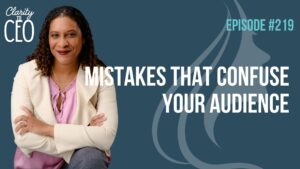Mastering the First Two Stages of the Customer Journey: Awareness and Consideration
In the latest episode of the Empower Business Accelerator Podcast, host Philippa Channer delves into the critical first two stages of the customer journey: awareness and consideration. These stages are essential for entrepreneurs looking to attract and engage potential clients effectively. Philippa emphasizes the importance of making a positive first impression and provides actionable strategies to help entrepreneurs navigate these stages successfully.
Awareness Stage
The awareness stage is all about getting your brand on the radar of potential clients. It’s not merely about visibility; it’s about ensuring that you are present in the right places and in the right manner. At this stage, your primary goal is to introduce your brand to individuals who may not yet realize they need your product or service. This is the moment to plant the seed and create that all-important first impression.
Key Strategies for the Awareness Stage
- Content Marketing
Content marketing is a powerful tool for attracting potential clients by addressing their pain points and interests. Here’s how to do it effectively:
- Identify Common Pain Points: Understand the challenges your ideal clients face. Create content that addresses these issues, offering solutions and insights.
- Diverse Content Formats: Utilize various content formats such as blog posts, social media updates, videos, and podcasts to reach a broader audience.
- Focus on Value: Instead of promoting your products or services directly, focus on providing valuable information that helps your audience. This positions you as a helpful resource.
Example: If you are a life coach focusing on helping busy moms achieve work-life balance, you might create blog posts and social media content around common struggles like time management and self-care. By consistently providing valuable advice, you become a trusted resource, keeping you top of mind when they are ready to seek help.
- Search Engine Optimization (SEO)
SEO is crucial for enhancing your online visibility. Here’s how to optimize your content for search engines:
- Keyword Research: Identify the keywords and phrases your potential clients are searching for. Use tools like Google Keyword Planner or Ahrefs to find relevant keywords.
- On-Page SEO: Optimize your website’s content, meta descriptions, and headers with these keywords. Ensure your content is structured and easy to read.
- Quality Content: Create high-quality, informative content that addresses the specific problems your clients are searching for. This increases the likelihood of appearing in search results.
Example: If you run a digital marketing agency, you might create a blog post titled “Top 10 Social Media Marketing Tips for Small Businesses.” By optimizing this post for relevant keywords, you increase the chances of attracting potential clients searching for social media marketing advice.
- Networking and Partnerships
Building relationships with other businesses and influencers can significantly expand your reach. Here’s how to leverage networking and partnerships:
- Collaborate with Influencers: Partner with influencers in your industry to reach a broader audience. Influencers can help promote your brand to their followers.
- Engage with Local Organizations: Join local chambers of commerce or industry-specific organizations. Attend events and engage with members to build relationships and increase your visibility.
- Cross-Promotions: Collaborate with complementary businesses for cross-promotions. This can help you reach new audiences who may be interested in your offerings.
Example: If you own a fitness studio, you might partner with a local health food store to offer joint promotions. This collaboration can help you reach health-conscious individuals who are likely to be interested in your fitness services.
Consideration Stage
Once potential clients are aware of your brand, the next step is to help them determine whether you are the right fit for their needs. During the consideration stage, clients begin to compare your offerings with others and evaluate their options. This is your opportunity to build trust and demonstrate your expertise.
Key Strategies for the Consideration Stage
- Educational Content
Educational content helps potential clients understand how your services can solve their problems. Here’s how to create effective educational content:
- Detailed Guides: Create comprehensive guides that address specific issues your clients face. These guides should provide actionable advice and demonstrate your expertise.
- Case Studies: Share case studies that showcase how you’ve helped other clients achieve their goals. Highlight the challenges, solutions, and results.
- Webinars: Host webinars on relevant topics. Webinars allow you to engage with your audience in real-time and answer their questions.
Example: If you run a digital marketing agency, you might create a detailed guide on “How to Create a Successful Social Media Strategy.” This guide can help potential clients understand the value of your services and how you can help them achieve their marketing goals.
- Social Proof
Social proof, such as testimonials and reviews, can significantly influence potential clients’ decisions. Here’s how to leverage social proof:
- Testimonials: Collect and share testimonials from satisfied clients. Highlight specific results and benefits they’ve experienced.
- Reviews: Encourage clients to leave reviews on platforms like Google, Yelp, or industry-specific review sites. Positive reviews can build trust and credibility.
- Success Stories: Share success stories that illustrate how your services have made a difference for your clients. Use real data and specific examples.
Example: If you are a business consultant, you might share a success story about how you helped a client increase their revenue by 30% through strategic planning. This story can help potential clients see the tangible benefits of working with you.
- Lead Magnets
Lead magnets are valuable resources offered in exchange for contact information. Here’s how to create effective lead magnets:
- Free Resources: Offer free resources like eBooks, checklists, or templates that provide value to your audience. Ensure these resources address specific pain points.
- Email Nurturing: Use the contact information collected to nurture the relationship through email marketing. Send regular updates, tips, and valuable content to keep your brand top of mind.
- Clear Call-to-Action: Include a clear call-to-action in your lead magnets, encouraging potential clients to take the next step, such as scheduling a consultation or signing up for a webinar.
Example: If you are a financial advisor, you might offer a free eBook titled “10 Steps to Financial Freedom.” This eBook can attract potential clients interested in improving their financial situation and provide you with their contact information for further nurturing.
Building Strong Relationships
The awareness and consideration stages are crucial for making initial connections and beginning to build trust with potential clients. By showing up consistently and offering valuable content, you are not just attracting potential clients; you are laying the foundation for a strong, lasting relationship.
Upcoming Opportunities
Philippa also highlights the upcoming Empower Program group session launching in January 2025, which offers a supportive community for entrepreneurs looking to elevate their marketing efforts. She encourages listeners to sign up for a free consultation session to learn more about the program and ensure it aligns with their journey.
Conclusion
In summary, building strong client relationships starts with making the right first impression. By effectively navigating the awareness and consideration stages of the customer journey, entrepreneurs can attract and engage potential clients, setting the stage for future success. Philippa encourages listeners to take action and make those important first impressions today.
By implementing these strategies, you can effectively attract and engage potential clients, building a strong foundation for lasting relationships. Remember, the key to success lies in providing value, building trust, and consistently showing up for your audience.














